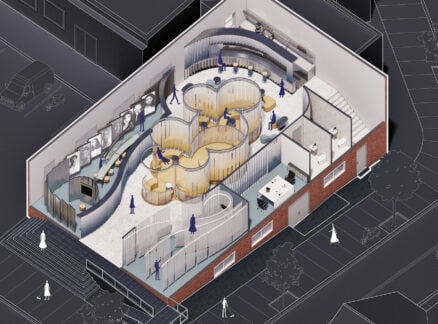February 1, 2007
Restoring the Real New Orleans
How do we save the Crescent City? Re-create the unique building culture that spawned it.
Like so many others, I have long been a visitor to New Orleans. In my case this goes back to 1979, when we studied the city to influence the design of Seaside, Florida. I have often been back because New Orleans is one of the best places to learn architecture and urbanism in the United States. My emphasis on design might seem unusual, but it shouldn’t: the design of New Orleans has a quality and character comparable to the music and cuisine that receive most of the attention.
In all those visits, I regret to admit, I did not get to know the people—not really. The New Orleanians I met were doing their jobs but not necessarily being themselves. Such is the experience of the tourist. This all changed when Katrina brought me back in the role of planner. Engaging the planning process brought me face to face with the reality.
Apart from the misconceptions of the tourist, I had also been predisposed by the media to think of New Orleans as a charming but lackadaisical and fundamentally mismanaged place that had been subjected to unwarranted devastation, with a great deal of anger and resentment as a result. That is indeed what I found at first. But as I engaged in the planning process I came to realize that the anger I witnessed was relative. It was much less, for example, than the bitterness one encounters in the typical California city plagued with traffic. The people of New Orleans have an underlying sweetness and a sense of humor, irony, and graciousness that is never far below the surface. These are not hard people.
Pondering this one day, I had an additional insight. I remember specifically when on a street in the Marigny I came upon a colorful little house framed by banana trees. I thought, “This is Cuba.” (I am Cuban.) I realized at that instant that New Orleans is not really an American city, but rather a Caribbean one. I understood that, when seen through the lens of the Caribbean, New Orleans is not among the most haphazard, poorest, or misgoverned American cities, but rather the most organized, wealthiest, cleanest, and competently governed of the Caribbean cities. This insight was fundamental because from that moment I understood New Orleans and truly began to sympathize. But the government? Like everyone, I found the city government to be a bit random; then I thought that if New Orleans were to be governed as efficiently as, say, Minneapolis, it would be a different place—and not one that I could care for. Let me work with the government the way it is. It is the human flaws that make New Orleans the most human of American cities. (New Orleans came to feel so much like Cuba that I was driven to buy a house in the Marigny as a surrogate for my inaccessible Santiago de Cuba.)
When understood as Caribbean, New Orleans’s culture seems ever more precious—and vulnerable to the effects of Katrina. Anxiety about cultural loss is not new. There has been a great deal of anguish regarding the diminishment of the black population, and how without it New Orleans could not regain itself. Just so. But I fear that the situation is more dire and less controllable. I am afraid that even if the majority of the population does return to reinhabit its neighborhoods, it will not mean that New Orleans, or at least the culture of New Orleans, will be back. The reason is not political but technical.
The lost housing of New Orleans is quite special. Entering the damaged and abandoned houses, you can still see what they were like before the hurricane. They were exceedingly inexpensive to live in, built by people’s parents and grandparents or by small builders paid in cash or by barter. Most of these simple, pleasant houses were paid off. They had to be because they do not meet any sort of code and are therefore not mortgageable by current standards.
It was possible to sustain the unique culture of New Orleans because housing costs were minimal, liberating people from debt. One did not have to work a great deal to get by. There was the possibility of leisure. There was time to create the fabulously complex Creole dishes that simmer forever; there was time to practice music, to play it live rather than from recordings, and to listen to it. There was time to make costumes and to parade; there was time to party and to tell stories; there was time to spend all day marking the passing of friends. One way to leisure time is to have a low financial carry. With a little work, a little help from the government, and a little help from family and friends, life could be good! This is a typically Caribbean social contract: not one to be understood as laziness or poverty—but as a way of life.
This ease, which has been so misunderstood in the national scrutiny following the hurricane, is the Caribbean way. It is a lifestyle choice, and there is nothing intrinsically wrong with it. In fact, it is the envy of some of us who work all our lives to attain the condition of leisure only after retirement. It is this way of living that will disappear. Even with the federal funds for housing, there is little chance that new or renovated houses will be owned without debt. It is too expensive to build now. The higher standards of the new International Building Code are superb but also very expensive. There must be an alternative or there will be very few “paid-off” houses. Everyone will have a mortgage that will need to be sustained by hard work—and this will undermine the culture of New Orleans.
What can be done? Somehow the building culture that created the original New Orleans must be reinstated. The hurdle of drawings, permitting, contractors, inspections—the professionalism of it all—eliminates self-building. Somehow there must be a process whereupon people can build simple, functional houses for themselves, either by themselves or by barter with professionals. There must be free house designs that can be built in small stages and that do not require an architect, complicated permits, or inspections; there must be common-sense technical standards. Without this there will be the pall of debt for everyone. And debt in the Caribbean doesn’t mean just owing money—it is the elimination of the culture that arises from leisure.
To start I would recommend an experimental “opt-out zone”: areas where one “contracts out” of the current American system, which consists of the nanny state raising standards to the point where it is so costly and complicated to build that only the state can provide affordable housing—solving a problem that it created in the first place.
However it may sound, this proposal is not so odd. Until recently this was the way that built America from the Atlantic to the Pacific. For three centuries Americans built for themselves. They built well enough, so long as it was theirs. Individual responsibility could be trusted. We must return to this as an option. Of course, this is not for everybody. There are plenty of people in New Orleans who follow the conventional American eight-hour workday. But the culture of this city does not flow from them; they may provide the backbone of New Orleans but not its heart.





